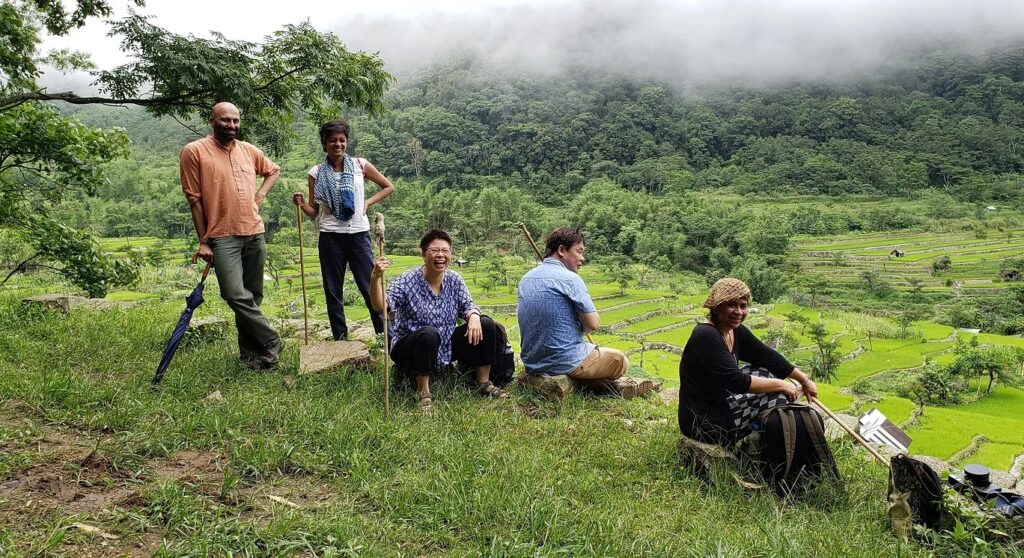„Crouching Tigers and Invisible Dragons: Representation of Desi Chinese in Indian Popular Cinema“
by Nadja-Christina Schneider
Lawrence Liang, professor of law at Dr. Ambedkar University Delhi, is well known as an academic, public intellectual and activist who has worked on issues such as Intellectual Property, Law and Public Culture, Free Speech as well as Media and Technology. However, he has hardly spoken publicly about the Indian Chinese or Desi Chinese community, to which Liang himself belongs. The thematic focus of this year’s Mother Language Day event on ‚Transcultural Encounters with Chinese communities, languages and cultures in Asia and Africa‘ on February 21, 2023 offered him a framework to speak for the first time on the topic of representation of Desi Chinese in post-independent Indian cinema.
In his fascinating lecture, which was supplemented by very interesting film stills and clips, Liang first gave an overview of more than seven decades of post-Independence film history, which is predominantly characterized by an absence or highly stereotypical representations of Indian Chinese. Absence also in the sense that Indian Chinese characters were rarely played by members of this community. If the question of representation were to be limited solely to the portrayal of individual characters, Liang argues, then this story would quickly come to an end. Much more interesting for him, therefore, is the question what the films reveal about the coexistence and historical context in which they are set or which the film plot addresses.
Feature films shot in the 1950s in particular, whose plots are set in earlier decades, convey much about a degree of mobility that viewers obviously took for granted as something which existed at the time between the port cities and adjacent regions of the Bay of Bengal, as well as a related form of cosmopolitanism in Indian cities, which was finally brought to an end by the establishment of nation-state borders after the end of the British Raj. As a film which, just a few years before the Sino-Indian Border War of 1962, shows a form of friendly bonding and solidarity beyond gender, caste, class, and ethnic boundaries in 1930s Bengal as a possibility, Mrinal Sen’s film Neel Akasher Neechey (Under the Blue Sky, 1959) stands out. It is also remembered today as the first film in independent India to fall victim to censorship:
Only many decades later, more precisely in the feature film Tubelight (dir. Kabir Khan), released in 2017 and set at the time of the 1962 war, Lawrence Liang again sees another rare film moment in Indian cinema that gives space to the idea of friendship and solidarity with the Indian Chinese. This time perhaps also motivated by a Chinese film market which is extremely promising for Indian films, and according to media reports in India was one of the reasons for casting Chinese actress Zhu Zhu in the female lead role.
Several years were to pass again before the episode Mumbai Dragon (dir. Vishal Bhardwaj) in the anthology Modern Love Mumbai (2022), streamed on Amazon Prime, also created a cinematic opportunity for the first time to make the long-taboo subject of the internment of three thousand Desi Chinese in the prison camp in Deoli in Rajasthan discussable. Singer, actor and presenter Meiyang Chang, who in this episode plays the role of a young man whose mother can only gradually adjust to his relationship with a young Gujarati woman, made an important statement when he publicly spoke out against cases of racial discrimination to which members of marginalized communities in India were particularly exposed during the Corona pandemic.
Together with his sister Jennifer Liang, Vidura Jang Bahadur, Jenny Pinto and Koel Chatterjee, Lawrence Liang has created the remarkable online archive Desi Chinese Project, which is an important knowledge resource on the long history and present of Desi Chinese in India. As Lawrence Liang mentioned in the discussion after his insightful talk, he hopes that this archive can eventually be adopted and continued by the whole community.





